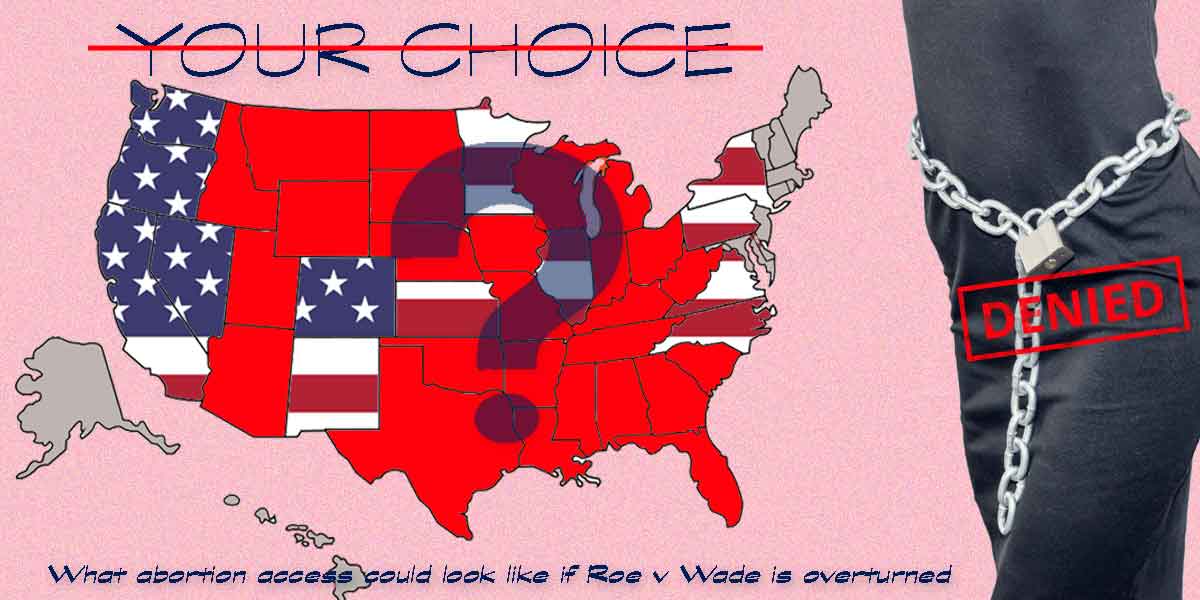Often at this time of year, I find myself thinking about years past, how blessed I have been to work in a field that still fills me with passion, and how exciting it is that the miracles of assisted reproduction are increasingly available and accessible to all.
But, while I’m no less passionate about IFLG’s work to ensure would-be parents and their families are legally protected, this New Year brings some troubling clouds on the horizon.
Reproductive rights in these United States are under attack, from right-wing lawmakers bent on using social divisions to gain and retain political power and from a vocal voting minority determined to instill extreme religious beliefs into public policy and governance. Now, several justices on the conservative-majority U.S. Supreme Court seem to be signaling their willingness to disregard decades of established legal precedent and leave each state’s political majority to decide whether American women have the basic human right of autonomy over their own bodies.
For the past few years, we’ve been reporting on the Court’s rapid rightward shift, designed and implemented by conservative political powers and accelerated with Trump’s appointment of three conservative justices in a three-year period, creating a 6-3 conservative majority. After a decades-long campaign focused on putting conservative judges on the bench, anti-choice activists and lawmakers seized on the recent sudden shift in the Court’s composition as their opportunity to attack women’s constitutional right to abortion. Dozens of Republican-majority state legislatures launched a barrage of clearly unconstitutional anti-abortion laws, with the ultimate goal of forcing a Supreme Court challenge and overturning Roe v. Wade, the case that established a woman’s right to choose in 1973. Several states have enacted abortion bans, only to have the laws stayed by the courts because they violated the constitutional rights established in Roe and upheld in 1993 in Planned Parenthood v. Casey. Many of those stayed state laws would take effect immediately were Roe overturned.
With two recent Court decisions, it appears the attacks may finally be hitting their mark.
Supreme Court Allows Vigilantes to Sue Abortion Providers
Texas SB8, which took effect on September 1, 2021, is one of a number of so-called “heartbeat bills” enacted by conservative state legislatures designed to challenge a core principle of “viability” in Roe, and later in Casey, which establishes a woman’s right to an abortion up to the time the fetus can reasonably be expected to survive outside the womb, or about 24 weeks. The Texas law, considered one of the most extreme bans in the country, makes abortion illegal from the time “cardiac activity” can be detected in the fetus, or about six weeks—before most women would be aware they were pregnant. The law makes no exceptions for rape or incest and clearly violates the constitutional rights established in Roe.
But the Texas law includes a new “twist” in its enforcement mechanism, deliberately crafted to subvert legal challenges. Rather than making state authorities responsible for enforcement of the law, it instead essentially deputizes private individuals to sue any person or organization—doctors, clinics, friends, Uber drivers—that aids or abets an abortion, providing a bounty of $10,000 for each successful lawsuit, with costs and attorney fees charged to the losing party. The provision achieves two things: It prevents plaintiffs from suing state authorities, since the state has no legal role in enforcing the law, effectively eliminating the right to legal redress; and it creates an ever-present threat of financial penalties that would effectively force most abortion providers or advocacy groups to shut down.
After the U.S. Supreme Court allowed the Texas law to go into effect, women’s healthcare providers challenged the enforcement provision in Whole Woman’s Health v. Jackson, asking among other things that providers be allowed to sue state court officials to reject “vigilante” SB8 lawsuits by private individuals. On December 10, the Court ruled that abortion providers may not sue the state—meaning the Texas legislators’ strategy to deny legal redress worked. Rather, the decision gives providers the right to sue state licensing agencies that would be responsible for stripping agencies of their licenses, after the agency had lost one of those vigilante lawsuits.
The inadequacy of the ruling in providing any relief for the providers was immediately apparent: one of the few remaining Texas providers said, despite the ruling, it would not resume operations unless the law were overturned, due to the financial burden of fines and legal fighting lawsuits.
In addition to the immediate issue of abortion rights, legal scholars have raised questions about the precedent established by Texas’ vigilante lawsuit model: If a state can successfully avoid legal challenges by deputizing private citizens to enforce the law and subvert the constitution, why not use similar mechanisms to attack other constitutional rights, as California Governor Gavin Newsom has already suggested in regard to life-saving gun control measures.
Justices Question Medical Standards of Fetal Viability in Mississippi Case
On December 1, the Supreme Court also heard oral arguments in Dobbs v. Jackson Women’s Health Organization, a challenge to Mississippi’s abortion law, which bans abortions after 15 weeks—well before the established “viability” standard of 24 weeks, at which medical professionals say a fetus can survive outside the womb. In crafting the bill, Mississippi legislators said openly they were doing so “because we have new Justices.”
Were the Court to uphold the Mississippi law, the decision would either gut the viability standard or overturn Roe entirely. In many states, restrictive abortion laws, on hold due to federal court rulings, would immediately take effect, and red-state lawmakers would unleash an avalanche of new ones.
Without a doubt, reproductive rights Americans have taken for granted for decades are now at risk.
The burden of being denied the right to an abortion would not be felt equally by every woman. Many states would continue to provide legal abortion services and to protect the rights of women to access those services. California leaders have called for creating an abortion “sanctuary,” providing services and support for women traveling from other states. In New York, Governor Kathy Hochul has vowed to create a “safe harbor” where women’s health and wellbeing are protected, as we reported in October.
Overturning Abortion Rights May Make IVF, Surrogacy Illegal
But many women living in states where abortion is illegal, particularly those who are low-income or without family support, would not have resources, time or ability to travel out of state for services. In some cases, since childbirth is inherently riskier than abortion, women would die giving birth to babies they did not wish to carry.
But the challenge to Roe v. Wade is about more than abortion rights.
If Roe v. Wade is overturned, many of the miraculous technological advances that today help millions of people suffering from infertility, as well as single and LGBTQ people, become parents could be banned. Even fertility preservation, the use of cryopreservation or freezing to preserve sperm, eggs or reproductive organs in the event of disease, injury or simply as a family-planning strategy, could become illegal if the right to abortion is overturned.
For example, in vitro fertilization, or IVF, a common treatment for infertility, typically results in the creation of multiple embryos. Typically, not all are used. The reproductive specialist, using advanced tools, selects the strongest, most vital embryos for implantation into the uterus of the intended mother or a surrogate. While once best practice would be to implant multiple embryos to increase the odds of a successful pregnancy, today better technology and higher success rates dictate that only a single embryo be implanted in most cases, preferable for the health of both mother and child.
But what happens to those unused embryos? Those deemed unviable are discarded. In some cases, intended parents opt to preserve via cryopreservation “extra” viable embryos for potential use at a future time. Years later, they may decide to use the embryos to have another child. Or they may not.
The principle of fetal viability now under attack at the Supreme Court is relevant in these kinds of fertility treatments. In banning abortion earlier and earlier in the pregnancy, the laws are protecting the rights of the fetus before the fetus would be able to survive outside a woman’s body—in some case placing the rights of the fetus above the rights of the woman carrying the pregnancy. If the rights of a fetus are protected at six weeks, when it would die outside of the womb, why stop there? Why not protect those rights from the point of conception?
Loss of Abortion Rights Would Open Door for Fetal ‘Personhood’ Laws
Some states already have gone there. Under Missouri’s “personhood” law, courts have ruled that unborn embryos are persons for the purposes of wrongful death claims, manslaughter and first degree murder charges. Under Louisiana’s law, yet to be tested in court, unborn embryos are designated “juridical persons” and are prohibited from destruction, with rights to sue and be sued, with disputes to be resolved in the embryos’ “best interests.”
So far, with the constitutional protections of Roe and Casey intact, women’s rights to abortion have not been denied under state personhood laws. But if the conservative Court invalidates the fetal “viability” standard, Americans’ access to treatment for infertility and other reproductive services may hinge on when each state decides human life begins.
Overturning Roe Risks Dreams of Parenthood for Infertile, Single, LGBT People
As many of my readers know, I decided to launch my fertility law practice after my husband, Tommy, and I became parents of twin boys, using egg donation, IVF and surrogacy. As a young gay man growing up in the Midwest, I assumed I would never have the opportunity to have a family, to be a dad. I accepted the reality, but with some regret.
But years later, reproductive technologies had advanced so much that so-called “test-tube” babies were no longer a novelty. Thousands of people were able to overcome infertility, and even our LGBTQ community was experiencing a “gayby boom.” As we learned more about the options, we gradually realized that what had seemed like an impossible dream, of becoming parents, could be a reality. The process of becoming dads the way we did was not easy, and it was not cheap, particularly 14 years ago when our boys were born. But it was worth every bit of time, money and emotion we put into it. It was a dream come true.
It was a dream that may be denied to others.
Today, as we wait for the Court’s decision on the Mississippi law, expected in May 2022, I wonder if Americans realize all that is at stake. I wonder if the thousands of people who have undergone treatment for infertility, or who have frozen eggs or sperm in advance of cancer treatment, or who have become moms or dads through the miracle of assisted reproduction, understand that, with a single decision, all of those possibilities could be gone.
We never know with certainty how a Supreme Court justice will rule. Chief Justice Roberts and Justice Sotomayor have both expressed concerns about public perception of the court and its politicization. We do know the legitimacy of the Court depends upon the faith of the American people, and that not even the Justices are immune to public opinion. As we look forward to 2022 and all the miraculous possibilities the coming year holds, if we can do nothing else, we must make sure that every American knows exactly how much all of us have to lose.




